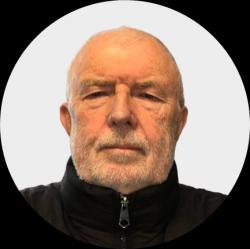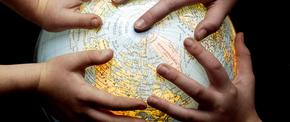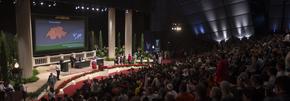The views expressed in our content reflect individual perspectives and do not represent the authoritative views of the Baha'i Faith.
I take an early walk every day. A few minutes after 7:00 am, turning onto the street where I live and walking with trekking poles, I came across a visibly drunk man, his bottle of wine already half-empty.
He asked me about my “walking sticks.” I explained that I use them because I have an Achilles heel injury. His round face shone with a subdued alcohol flush. Even in his alcoholism, though, he still seemed curious – a good sign, perhaps? An image of him as a Buddhist monk flashed in my imagination.
We can take one of two attitudes toward our fellow humans. We can view and treat them as separate and alien to ourselves – the attitude known as “othering” – or alternatively, we can try to see the face of God in everyone. The Jewish philosopher Emmanuel Levinas wrote that the essence of religion involves looking into another person’s face and finding there the commanding presence of God.
Guess which one is really challenging!
Connecting with Other People and Other Religions
Perhaps I passed muster on that one encounter. Often I fail, but life is about connecting. That includes connecting with religions other than our own. Such links are vital. Why? Those vital bonds can help us reduce our othering, realize our close connections across cultures, class, and creed, and help lessen the grip of our egotistic self.
The Baha’i teachings ask us all to recognize the oneness of humanity and of religion. Abdu’l-Baha, speaking of the central mission of his father Baha’u’llah – the prophet and founder of the Baha’i Faith – wrote that the purpose of this new Faith is:
… to lead every soul on earth to concord, to fellow-feeling, to oneness; to make known amongst all peoples the sign of the singleness of God, so that at last the primal oneness deposited at the heart of all created things would bear its destined fruit …
Doing our best to see this “primal oneness deposited at the heart of all created things” lessens the covering up of our true and real selves. Lessen the grip of othering, and light breaks through.
In addition to making connections with our fellow humans, we need a gateway to bridging the divide between religions. To get that we need a key teacher, and key teachings that together reveal the underlying oneness of all Faiths and traditions. Why do we set out to create that connection? We all will have our own reasons. As a Baha’i, I am asked by Baha’u’llah to see all divine messengers as one:
It is clear and evident to thee that all the Prophets are the Temples of the Cause of God … If thou wilt observe with discriminating eyes, thou wilt behold Them all abiding in the same tabernacle, soaring in the same heaven, seated upon the same throne, uttering the same speech, and proclaiming the same Faith.
After more than half a century of practicing and studying this principle of oneness I have two guiding views.
The first: elites tell me that the mystical is the prerogative of only special people, whereas I see it as an essential part of being human, like loving and philosophizing.
The second: mysticism shows the true heart of a religion, or of an individual human being.
So how do we set out to create that mystical connection? Constant prayer and meditation might reduce the time required to study. Having said that, it has taken me more than half a century!
What do we actually do to set out to create that connection? We need to seek out what is the same at the heart-center of the religions. This is a spiritual quest, not a collection of information. Superficial surface facts may be true, but irrelevant to deeper, mystical, experience and the profound inner knowing that comes with it.
When should we set out to create that connection? The answer is “If not now, when?”
With whom shall we seek to set out to create that connection? I would recommend choosing carefully those with whom to walk the talk – I’ve learned that’s essential.
I have also found that triangulating helps. What’s that? If three major religions say the same thing about, for example duality and non-duality, or “God is love,” then that commonality becomes a strong pointer. To what? To their being in touch with truth, beauty, goodness or justice, and with reality and our true self. But we must always start with our felt experience.
Walking with the Great Spiritual Teachers
On my walks, I walk in the company of outstanding spiritual teachers, including the Baha’i teachers Baha’u’llah, Abdu’l-Baha, and the Guardian of the Baha’i Faith, Shoghi Effendi. How? I walk with them by listening to recordings of their teachings. What are the benefits to our selves, and to others, if we have such gateway relationships? Importantly, we are less in danger of becoming exclusivists, triumphalists, or fundamentalists about our own faith community and its teachings. Also, we benefit from reading one text in the light of another, because it develops sensitivity, sensibility, and humility.
While walking on any spiritual quest, we are in some measure entering on a hero’s journey. We all need heroes. For me, the Jewish Rabbi Abraham Joshua Heschel is a hero. He walked the talk, literally as well as metaphorically. He marched in the Selma protest alongside Dr. King. Heschel said, “When I march in Selma, my feet are praying.” But Heschel was not just a great Rabbi for Jews, he was a gift to the whole of humankind. I love listening to his writings while I walk.
In his masterpiece Man Is Not Alone: A Philosophy of Religion, he exquisitely described a range of key teachings including a cosmology defining the two worlds or realms in which we have our spiritual citizenship, from the dual to the non-dual. He did that in a passage of eight sentences. I have read and heard this passage many times and always I return with more insights:
The search for reason ends at the known; on the immense expanse beyond it only the sense of the ineffable can glide.
It alone knows the route to that which is remote from experience and understanding.
Neither of them is amphibious: reason cannot go beyond the shore, and the sense of the ineffable is out of place where we measure, where we weigh.
We do not leave the shore of the known in search of adventure or suspense or because of the failure of reason to answer our questions.
We sail because our mind is like a fantastic seashell, and when applying our ear to its lips we hear a perpetual murmur from the waves beyond the shore.
Citizens of two realms, we all must sustain a dual allegiance: we sense the ineffable in one realm, we name and exploit reality in another.
Between the two we set up a system of references, but we can never fill the gap.
They are as far and as close to each other as time and calendar, as violin and melody, as life and what lies beyond the last breath.
Heschel’s passage reminds me of a passage by Abdu’l-Baha that was an ‘aha’ moment for me:
it (Human Reality) is the same reality which is given different names, according to the different conditions wherein it becomes manifest.
Because of its attachment to matter and the phenomenal world, when it governs the physical functions of the body, it is called the human soul.
When it manifests itself as the thinker, the comprehender, it is called the mind.
And when it soars, and travels in the spiritual world, it becomes designated as spirit.
Reason is limited. Why? because it always starts somewhere, and does so with a set of hidden assumptions. The “immense expanse beyond” that Heschel describes surpasses the tools of reasoning, and its infinity points to God and the un-knowableness of God. Our sense of the ineffable takes on a spiritual journey – soaring “into the atmosphere of God,” as Abdu’l-Baha said. If we can see that reality in every human being, we have attained spiritual growth. I’m still walking, trying to do that.
Rabbi Heschel and the teachings of Judaism focus on the exact same love for humanity the Baha’i principles do: With no “othering” there-is-no-Other.
















Comments
Sign in or create an account
Continue with Googleor